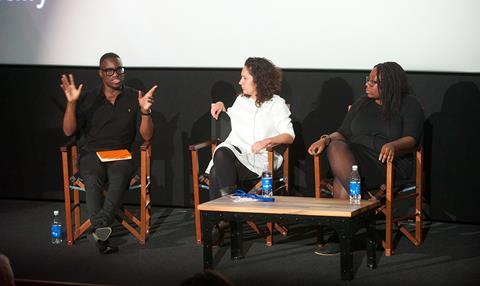Femi Oguns, Matimba Kabalika and Deborah Sathe discussed quotas and the continued lack of BME talent in the film industry

The hotly-debated subject of diversity in the film industry was tackled at the Screen Film Summit (Dec 10), with panellists criticising the continued lack of progress.
On the panel were Femi Oguns, CEO of the Identity Drama School and agent Star Wars: The Force Awakens actor John Boyega, and Matimba Kabalika, NET.WORK talent co-ordinator and content editor at the BFI.
The session was chaired by Deborah Sathe, head of talent development and production for Film London.
Quotas
Host Sathe kicked off the session by asking the panellists whether quotas were the best way to address the current imbalance.
“There should be a quota system because people’s attitudes haven’t improved yet,” said Oguns. “The industry is supposed to mirror what goes on in society. If attitudes don’t change, we have to force change through quotas.”
Kabalika responded that while she agreed with quotas, she also saw them as potentially limited: “We need to make sure we have a long-term plan. People want to be assessed on their talent.
“If we do things in the long term, hopefully we won’t see another statistic [about the lack of diversity in the film industry], the bigger question is: how do you stop history repeating itself?”
Talent
Responding to audience questions about whether minorities could become overly reliant on schemes and quotas, Kabalika emphasised that diversity quotas and individual talent and effort were not mutually exclusive, and should work in tandem.
“It’s not a case of one or the other,” she said. “It is always about the content but it’s 2015 – I don’t think we can sit by and think the number of women directing films is okay. It’s about having opportunity.
“Diversity doesn’t mean that the content won’t be good enough, you’re not sacrificing.”
Oguns added: “I didn’t rely on any funding whatsoever. I’m the architect of my own fortune.” But he added there were many traps laid for minority talent. He used the example of Boyega to emphasise how essential it is for talent to make the correct choices.
He said that in Boyega’s early career, he was in danger of becoming typecast in what he described as predictable roles for black talent: “We’re so caught up in the black experience, the black perspective. Sometimes it feels like the only thing we can do is tell the same stories.
“But we are individuals, the only experiences we all share are of isolation and struggles. There are such a wealth of stories that come from the BME group. The majority of black directors only get assigned to direct stuff that is culturally specific to them,” he added.
Host Sathe concluded the debate by reiterating the need for a continued dialogue about diversity: “We’ve sat on a stage many times and talked about diversity, but if nothing changes we will keep having the conversation.”























No comments yet